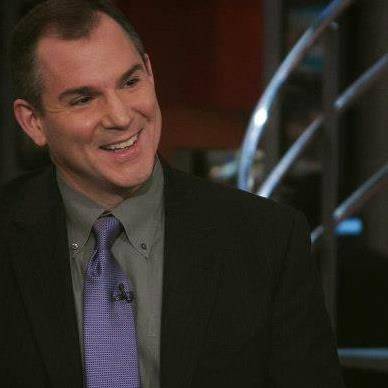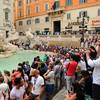Is it Really Heartbreak Italy?
ROME - The other day the Italy aficionado and reporter Frank Bruni published a long and thoughtful article in the New York Times under the title "Italy Breaks Your Heart." After his most recent visit to Italy--Milan, the Marche--he concluded that: "Italy is what happens when a country knows full well what its problems are but can’t summon the discipline and will to fix them. It’s what happens when political dysfunction grinds on and on and good governance becomes a mirage, a myth, a joke."
It would be hard not to agree with that, but to me his words raised another question: are Italians as heart-broken as Bruni says he is? The answer is no. The Italians I meet and speak with every day--they include the friendly rubbish sweepers encountered while walking the dogs early in the morning, the well dressed ladies in the cafes, the bank officers in Rome, the reporters and TV producers we see professionally, the weekenders visiting from the North of Italy, the gifted chefs, the olive pickers in our garden--are just plain angry. They are angry at each other, they are angry at Silvio Berlusconi, his obfuscations, his re-invention of Forza Italia, his trying to shove his shy daughter Marina into becoming his political clone (no fool, she refuses). And they are angry when he says, shamelessly: "In case there are elections I feel it my duty to remain in the front lines, to commit myself directly," he said. Might it not be more his duty to accept a high court decision and show respect for the justice system? "I have a special relationship with the Italians who, like me, fear that the left can go into government," he added. What? The left is already in government, in a coalition which Berlusconi himself approved, with Berlusconi's own people whom he is now disavowing because they prefer not to bring down the government in the middle of an economic crisis which, we are promised, will improve next year or maybe the year after that.
On the left they are angry with the old guard of the Partito Democratico (PD), meaning cigar-smoking Pier Luigi Bersani, party secretary for four years, and his predecessor Massimo D'Alema. Who can ignore that countless PD sections have grossly inflated their membership rosters so as to give certain candidates more votes in that party's much-postponed convention Dec. 10? And they are angry at Nikki Vendola, whose SEL is the PD ally in government, because he is being drawn into a local scandal.
Some are angry with Premier Enrico Letta. Despite his managing to hold the situation together in an uphill struggle every moment of every day, his popularity has sunk to around 33%. They are far more furious with his predecessor, former Premier Mario Monti, who has shown a striking inability to grasp the simplest elements of political life--and who has even blamed the gift of a dog for some of his woes.
Some are angry with the personal values their children have learned from Mediaset TV sleaze. Many are outraged that 40% of their young people have little hope of finding a paying job when certain RAI TV hosts like Bruno Vespa have a take-home salary, paid by the state, on the order of $1 million a year. As one irate viewer put it, "They force you, coerce you, to pay a yearly fee to see TV shows at the limit of indecency and ridicule, programs for the brainless demented....They are paid like Croesus and shamelessly enjoy the good life, despite the crisis and the lack of work for the majority."
They are angry at their government, when it was announced that Spain is emerging from the recession but that Italy is not. They are angry at Justice Minister Anna Maria Cancellieri, who intervened to obtain a release from prison of the troubled daughter of the crooked businessman, octogenarian Salvatore Ligresti. Cancellieri defends herself, saying that she did so for humanitarian reasons (the woman, anorexic, was at serious risk). Fair enough, but if Cancellieri is so humanitarian minded, why has she not done the same for other sufferers in Italian prisons?
A few are angry even at Mr. Anger himself, Beppe Grillo, whose showing in the polls has declined (if only slightly) even as he continues to exploit the widespread anger. Grillo and Grillismo are under attack within his own movement, in which he expelled two of his senators for having introduced a motion asking for the abolition of clandestine immigration as crime.
Most of all they are angry with the evidence of the corruption that has become endemic in Italy in the past two decades.
Small wonder, then, that the largest political party in Italy remains, as of this week, the one-third of Italians (33.3%) who tell the pollsters that they will abstain in any future election. Of these, a small percentage says they will turn in blank ballots; the others are undecided. These alienated voters far outweigh both the PdL-Forza Italia, with 25.4% (in decline from previous weeks according to various polling companies) and the PD, with somewhere around 32%.
These polls are being closely watched because the Letta government continues to be at risk of collapse under the weight of the forthcoming vote in the Senate, expected to strip Berlusconi of his status as senator. At this point the Berlusconi hawks are already in his reborn party, Forza Italia, while the hold-outs from his PdL are stubbornly trying to continue to support the emergency government headed by Letta. Can they succeed? That is anybody's guess.
Amid all this anger there was also a cheery moment, fortunately. This week's good news was that the forthcoming (though in no hurry) Senate vote on Berlusconi will not be secret. Heads can be counted, meaning that, to put it crudely, it is now more difficult for vote-buying to take place. Those objecting to this roll-call vote say it undermines democracy; those supporting it say that, if a politician disagrees with his party, he should change allegiance openly and above-board.





































i-Italy
Facebook
Google+
This work may not be reproduced, in whole or in part, without prior written permission.
Questo lavoro non può essere riprodotto, in tutto o in parte, senza permesso scritto.